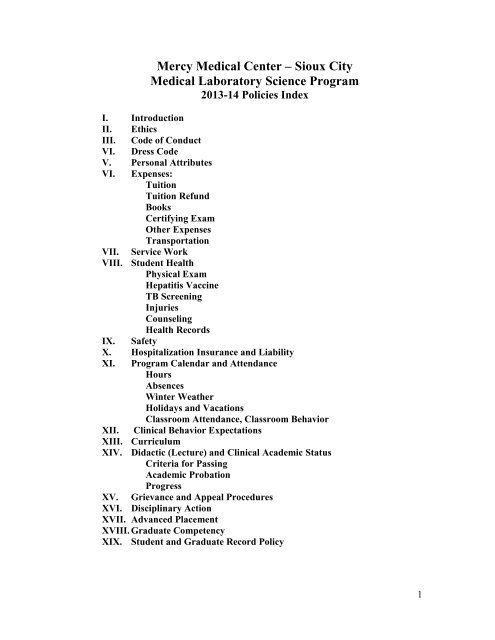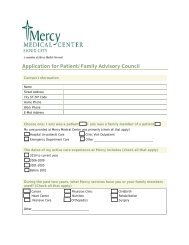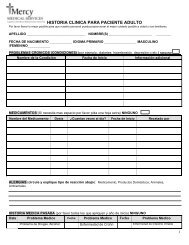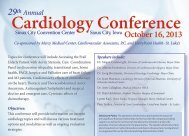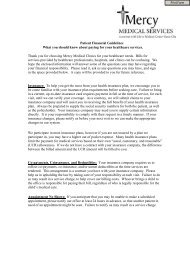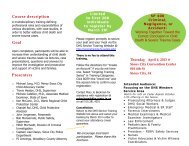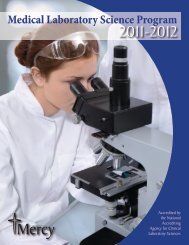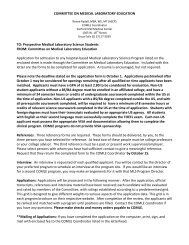Program Policies - Mercy Medical Center Sioux City
Program Policies - Mercy Medical Center Sioux City
Program Policies - Mercy Medical Center Sioux City
Create successful ePaper yourself
Turn your PDF publications into a flip-book with our unique Google optimized e-Paper software.
7. HEALTH RECORDS: The MMC-SC <strong>Program</strong> Director and the MMC-SC EmployeeHealth Nurse will maintain confidentiality of student health records. Vaccination andMMC-SC laboratory testing records from the Employee Health office will be turned overto the MMC-SC <strong>Program</strong> Director, and retained in the graduate’s permanent file.IX. SAFETYMMC-SC laboratory is committed to providing a safe work environment and believesthat employees and students have a right to know about health hazards associated withtheir work.The MMC-SC Laboratory Safety Manual contains written policies and procedures for thelaboratory’s scope of activities. Such areas include General Laboratory Safety,Emergency/Disaster, Infection Control, as well as Fire Safety, Electrical Safety,Chemical and Biohazard communications. Material Safety Data Sheets are located ineach laboratory section and on the MMC-SC intranet. Organizational Safety, Disaster andInfection Control policies are referenced in the laboratory policies and found on theMMC-SC intranet. The MMC-SC <strong>Program</strong> Director reviews the contents and location ofthe Laboratory Safety Manual with students during Orientation. In addition they completeonline CAP training in General Laboratory Safety.During the <strong>Program</strong> Orientation, students are required to attend the MMC-SCOrientation, which includes topics of Infection Control (Hand washing, UniversalPrecautions, Blood borne Pathogens), Environment of Care (Fire, Electrical andChemical Safety, Disasters), Employee Health (Blood and Body Fluid exposures,Hepatitis Vaccines).There are many engineering devices throughout the Laboratory to help make laboratorywork safer, including state of the art instrumentation, safety shields, goggles, fluidresistant lab coats, gloves and phlebotomy equipment. Students are shown the location offire extinguishers, hazardous spill kits, eye wash stations, and exits, and instructed onhow to use the safety equipment.An evaluation of all incident and accident reports is carried out within the Hospitalprocesses to eliminate hazards, to educate, and to increase safety in the workplace.X. HOSPITALIZATION INSURANCE AND LIABILITYStudents are required to have health insurance coverage for the clinical year. Any costsfor medical care and treatment other than for initial blood and body fluid exposuretesting, will be the responsibility of the student and/or the student’s personal healthinsurance policy.MMC-SC maintains a comprehensive liability insurance program, which covers studentsduring the 12-month period in which they are enrolled in the MMC-SC’s <strong>Medical</strong>Laboratory Science program.6
Students will spend scheduled visits to two off-site laboratories (clinic, physician’s officelaboratory, etc.) later in the program year. The student will make arrangements for thevisit. The objective for this learning experience is for students to view other laboratoriesin operation, i.e. different management styles, procedures and instrumentation. This isstrictly an observation visit and students should not perform any service work.3. ABSENCES: Students will be allowed three personal days if needed forillness, travel, appointments, interviews, etc. One additional day will be allowed for a jobinterview. Students who are absent beyond four days will make up clinical time missed,by completing clinical time during scheduled academic calendar breaks, at the end of theclinical year, or on weekends or evenings when a teaching technologist is available.Makeup hours are subject to approval by the MMC-SC <strong>Program</strong> Director. Students areresponsible for all lecture material missed due to absence.Students are responsible for notifying the MMC-SC <strong>Program</strong> Director, ClinicalInstructor, or laboratory office; if they are ill and unable to attend, or will be late, beforethe start of scheduled clinical time (0600 or 0700). Scheduling of non-emergency doctorand dentist appointments should be made outside of program hours if possible. Absencesor appointments due to extenuating circumstances should be discussed with the <strong>Program</strong>Director.A Leave of Absence (LOA) may be granted up to 30 days. Reasons for request of a LOAmay include, but are not limited to health, personal or family circumstances. Propermedical documentation will be required if appropriate. A conference with theappropriate faculty and MMC-SC <strong>Program</strong> Director, and a written request is required. Ifa student does not return within the 30-day time limit, or appropriately corresponds withthe MMC-SC <strong>Program</strong> Director, the student will be dismissed from the program. Nomore than a single LOA will be granted to a student within any 12-month period.Bereavement leave will be granted when a death occurs in a student’s family. Studentswill be excused for up to three days when death occurs in the immediate family. One daywill be granted when death occurs in the extended family. Immediate family is definedas spouse, children or step children, parents, brothers or sisters of the student. Extendedfamily is defined as grandparent of student or spouse, grandchild, parent-in-law, son-inlaw,daughter-in-law, brother-in-law or sister-in-law.4. HOLIDAYS & VACATIONS: The following holidays will be observed: Labor Day,Thanksgiving Day, Christmas Day, New Years Day, Good Friday, Easter Monday,Memorial Day, and July 4th. There will be a short fall break, three-day Thanksgivingbreak, approximately two weeks of vacation during the Christmas holiday season and aone-week spring break.5. WINTER WEATHER CLASS &/OR CLINICAL CANCELLATION: Nostudent is expected to jeopardize his/her personal well-being or safety to attend class orclinical experience because of inclement weather. The decision to cancel class and/orclinical experience will be made by the program director. In addition, when St. Luke’sCollege is closed and classes are cancelled, no classes or clinical experiences will be8
conducted. However, cancellation of classes/clinical experiences beyond two days willneed to be made-up and will be scheduled by the MMC-SC and St. Lukes’s Collegeprogram directors. The Monday following Easter is designated as a scheduled make-upday, if needed.6. CLASSROOM ATTENDANCESuccess in the didactic portion of this program is directly related to class attendance.Students are expected to attend all class sessions and to be on time. Attendance/tardinesswill be recorded for each class session. Students are responsible for reading classassignments, and completing study questions and clinical situations (case studies). Thestudent must notify the <strong>Program</strong> Director or classroom instructor prior to the start of classif he/she cannot be in class or will be late. Failure to do so will result in an unexcusedabsence. Each unexcused absence or two occurrences of unexcused tardiness will resultin a 5% deduction in the course grade. Excessive absences, excused or unexcused, due toany circumstance may result in a percentage reduction in the course grade per decision ofthe instructor and/or program director. If a student misses a class session, it is theresponsibility of that student to obtain class materials, notes, etc. No make-up classsessions will be held.Classroom Behavior You are expected to be on time with the required textbook and all neededmaterials for each class session. You are expected to pay attention, take notes, ask questions, and participate indiscussions. You are expected to act like a professional and respect others’ opinions. No cell phones or pagers are to be used during class. Cell phones may be usedduring designated break times. All <strong>Mercy</strong> <strong>Medical</strong> <strong>Center</strong>-<strong>Sioux</strong> <strong>City</strong>/St. Luke’s College MLS program policiesregarding academic honesty and integrity will be enforced.XII. CLINICAL BEHAVIOR Expectations (Affective Objectives): The studentwill complete assigned objectives, reading, and study questions for each clinical rotation.The student will take quizzes covering the weekly objectives and the readingassignments, usually each Friday (or on the following Monday with permission). Writtenclinical evaluation forms are to be completed by the supervising MLS/technologist(s) atthe end of each rotation. The results will be shown to the student, with opportunity fordiscussion. The following are general affective objectives for each laboratory departmentand are measured by the evaluation completed at the end of rotations (exception – there isonly one evaluation after the 2 nd urinalysis rotation since each rotation is one week long).During each clinical rotation, the medical laboratory science student will:1. apply theory to laboratory testing by:a. preparing for laboratory instruction by completing assigned reading.b. applying previously learned theory to the current situation.c. correlating lab data and try to resolve problems.d. showing interest in patient results and relating abnormal test results toclinical significance.9
2. demonstrate responsibility for learning by:a. assuming responsibility for completing department objectives and studyquestions; utilizing department resources.b. listening to and following directions; then readily proceeding withprocedures.c. carrying out recurring responsibilities with a decreasing amount ofsupervision.3. apply laboratory protocol for proper specimen identification and handling by:a. recognizing unacceptable specimens and criteria for rejection.b. following appropriate handling based on specimen priority.4. practice communication and interpersonal skills by:a. listening carefully to instructions; asking questions or givingacknowledgment.b. handling telephone communication courteously.c. completing written records legibly.d. cooperating with other hospital personnel to complete tasks.e. displaying a pleasant, courteous attitude in performing day-to-daylaboratory duties.5. operate instruments as instructed by the supervising MLS/technologist,participating in preventative maintenance, and assisting in trouble shooting whenpossible.6. perform quality testing by:a. adhering to department procedures and quality control.b. recognizing abnormal results and reporting them to the supervisingMLS/technologist, repeating questionable results as indicated.7. organize workload according to department protocol by:a. completing tasks despite interruption.b. progressively performing more than one test at a time.c. assisting others with workload when appropriate.8. demonstrate laboratory safety by:a. use of personal protective equipment when handling patient specimens.b. keeping the work area orderly; disinfecting work areas as directed.c. disposing of laboratory waste following laboratory protocol.d. locating fire and safety equipment.9. demonstrate professional development by:a. striving to work well independently or as part of a team.b. developing confidence in laboratory skills, but recognizing limitations.c. accepting constructive criticism as an opportunity to improve.d. using extra clinical time to assist others with workload or extra study.10. demonstrate reliability and integrity by:a. arriving in the laboratory department prepared to begin work promptly.10
. notifying instructor of absences.c. returning from break without delay.d. practicing good grooming and adherence to dress code.e. treating patient information as confidential.f. admitting mistakes.XIII. CURRICULUMDidactic: Phlebotomy/OrientationUrinalysisHematology/CoagulationChemistry/Body FluidsMicrobiologyImmunohematologyImmunology/SerologyManagement/Education/EthicsReviewClinical: Phlebotomy/Spec. ProcessingUrinalysisHematology/CoagulationChemistryMicrobiology/Mycology/ParasitologyImmunohematology (Blood Bank)Serology/ImmunologyReview/Evening Shift1 week2 weeks12 weeks10 weeks10 weeks6 weeks3 weeks3 weeks2 weeks2 weeks2 weeks8 weeks8 weeks11 weeks6 weeks3 weeks1 weekXIV. DIDACTIC (LECTURE) AND CLINICAL ACADEMIC STATUSThe MMC-SC <strong>Program</strong> Director keeps records of each student’s performance in bothlecture and clinical areas of study. These records are used to assess the student’sprogress. The following policies cover academic status up to and including dismissalfrom the <strong>Program</strong>.Criteria for Passing1. The grading system: Grade Definition PercentA 90-100%B Satisfactory 80-89%C 70-79%Below 70% is considered as failing.2. Final grades will be tabulated as follows:50% - Average of lecture exams50% - Average of clinical department evaluation, written quizzes, and practicalexams.Averages are computed in terms of percentage and converted to letter grades at the end ofeach course.11
Progress1. Any problem with progression in the program is considered on an individual basis.Possible extenuating circumstances such as illness or extended excused absences will beconsidered. Make-up course work will be determined by the instructors and <strong>Program</strong>Director.2. Students who are absent beyond three days will make up clinical time which will becalculated at 5 hours per day. Records will indicate the clinical department where timeneeds to be made up.3. If a student chooses to withdraw from the program, he/she must submit a writtenstatement of withdrawal to the <strong>Program</strong> Director. The <strong>Program</strong> Director will notify thecollege/university of the student’s withdrawal or dismissal from the program. Thecollege/university will be sent a transcript of any final grades attained. A final grade fora course is earned after satisfactory completion (70% or higher) of all requirements for acourse, including both didactic and clinical rotation requirements.4. If an instructor suspects that a student is having emotional or behavioral problems,which are affecting the student’s progress, the student will be offered referral to theMMC-SC Employee Assistance <strong>Program</strong>.5. <strong>Program</strong> Officials will handle management of academic or behavioral problems,including counseling, in a confidential manner.XV. STUDENT ACADEMIC AND NONACADEMIC APPEAL/GRIEVANCEPROCESSIt is expected that most day-to-day problems and conflicts between student and staff willbe resolved promptly and amicable by discussion with persons involved. However, it isconceivable that due to extenuating circumstances or situations, a student may feel thathe/she has a legitimate complaint not resolved in the above manner. If this is the case,the student has the right to report the grievance via the procedure outlined below.1. Discuss the problem with the <strong>Program</strong> Director. The <strong>Program</strong> Director willinvestigate the complaint and respond to the student within two days.2. If, within three working days after Step 1 has been initiated, the complaint is notresolved to the student’s satisfaction, it is the responsibility of the student to state thecomplaint in writing and submit it to the <strong>Medical</strong> Director. It is the responsibility of the<strong>Medical</strong> Director to investigate the complaint and respond to the student within threedays.3. At this time, the student has the right to appeal any decision.APPEAL PROCEDURE1. A committee will be appointed to review the complaint. The committeewill consist of the following: MMC-SC <strong>Program</strong> Director, <strong>Medical</strong> Director, CollegeAdvisor, two other lab faculty members of the student’s choice, and representative ofMMC-SC Human Resources/Education department. The decision of the committee willbe final.13
XVI. DISCIPLINARY ACTIONReasons for disciplinary actions up to and including dismissal are as follows:1. Scholastic failure2. Technical incompetence3. Theft, immoral conduct, fighting, willful destruction of property on hospital grounds4. Being under the influence of alcohol, drugs, or chemicals5. Inconsiderate treatment of patients or discussion of confidential information withunauthorized persons6. Cheating on school examinations or dishonesty in the performance or reporting of testprocedures.7. Excessive unexcused absenteeism and/or tardiness8. Any other act classified as criminal.XVII. ADVANCED PLACEMENTThe student having previous clinical laboratory experience (MLT) will be evaluated onan individual basis and will have to demonstrate his/her expertise in the clinicallaboratory to the satisfaction of the MMC-SC <strong>Program</strong> Director, Department Supervisor,and Clinical Instructor(s).Upon demonstration of competency, the exceptional student would be encouraged tobroaden his/her educational background by researching and developing special tests andinstruments, and assisting with special projects. The didactic portion of the program doesnot lend itself to advanced placement.XVIII. GRADUATE COMPETENCY*DESCRIPTION OF CAREER ENTRY OF THE MEDICAL LABORATORYSCIENTISTMMC-SC <strong>Medical</strong> Laboratory Science <strong>Program</strong> provides students with an educationalenvironment in which the following competencies will be attained upon completion:1. Demonstrate possession of the knowledge and technical skills to be proficient inperforming the full range of clinical laboratory tests and the capability to adapt thisknowledge to new situations.2. Develop and analyze test systems and interpret findings.3. Demonstrate proficiency in clinical decision-making, analysis, evaluation, andinterpretation of compliance with applicable regulations.4. Demonstrate a desire for continuing education and professional development.5. Participate in quality assessment/performance improvement systems for continuingimprovement of the clinical laboratory and patient care.6. Communicate effectively with a variety of persons both within and beyond theclinical laboratory, including all members of the healthcare team, external customers,and patients.7. Participate in the management of financial, operational, material, and humanresources which leads to a cost-effective, high-quality laboratory environment.8. Demonstrate possession of knowledge and skills to effectively use information14


